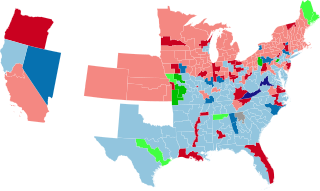
In bacteriology, gram-positive bacteria are bacteria that give a positive result in the Gram stain test, which is traditionally used to quickly classify bacteria into two broad categories according to their type of cell wall.

The Burkholderiales are an order of Betaproteobacteria in the phylum Pseudomonadota. Like all Pseudomonadota, they are Gram-negative. They include several pathogenic bacteria, including species of Burkholderia, Bordetella, and Ralstonia. They also include Oxalobacter and related genera, which are unusual in using oxalic acid as their source of carbon. Other well-studied genera include Alcaligenes, Cupriavidus, Achromobacter, Comamonas, Delftia, Massilia, Duganella, Janthinobacterium, Polynucleobacter, non-pathogenic Paraburkholderia, Caballeronia, Polaromonas, Thiomonas, Collimonas, Hydrogenophaga, Sphaerotilus, Variovorax, Acidovorax, Rubrivivax and Rhodoferax, and Herbaspirillum.

The 1912 United States House of Representatives elections were elections for the United States House of Representatives to elect members to serve in the 63rd United States Congress. They were held for the most part on November 5, 1912, while Maine and Vermont held theirs in September. They coincided with the election of President Woodrow Wilson.
The 1908 United States House of Representatives elections were held for the most part on November 3, 1908, with Oregon, Maine, and Vermont holding theirs early in either June or September. They coincided with the 1908 United States presidential election, which William Howard Taft won. Elections were held for all 391 seats of the United States House of Representatives, representing 46 states, to serve in the 61st United States Congress.

The 1900 United States House of Representatives elections were held for the most part on November 6, 1900, with Oregon, Maine, and Vermont holding theirs early in either June or September. They coincided with the re-election of President William McKinley. Elections were held for 357 seats of the United States House of Representatives, representing 45 states, to serve in the 57th United States Congress. Special elections were also held throughout the year.

The Alteromonadales are an order of Pseudomonadota. Although they have been treated as a single family, the Alteromonadaceae, they were divided into eight by Ivanova et al. in 2004. The cells are straight or curved rods. They are motile by the use of a single flagellum. Most of the species are marine.

The 1882 United States House of Representatives elections were held for the most part on November 7, 1882, with five states holding theirs early between June and October. They occurred during President Chester A. Arthur's term. Elections were held for 325 seats of the United States House of Representatives, representing 38 states, to serve in the 48th United States Congress. They were the first elections after reapportionment following the 1880 United States census, increasing the size of the House. Special elections were also held throughout the year.

The 1880 United States House of Representatives elections were held for the most part on November 2, 1880, with five states holding theirs early between June and October. They coincided with the 1880 presidential election which was won by James A. Garfield, who was a member of the House at the time. Elections were held for 293 seats of the United States House of Representatives, representing 38 states, to serve in the 47th United States Congress. This was the first time that every state held their regular House elections on or before Election Day. Special elections were also held throughout the year.
In taxonomy, Rhodothalassium is a genus of the Rhodobacteraceae. Up to now there is only one species of this genus known.
The Chloroflexota are a phylum of bacteria containing isolates with a diversity of phenotypes, including members that are aerobic thermophiles, which use oxygen and grow well in high temperatures; anoxygenic phototrophs, which use light for photosynthesis ; and anaerobic halorespirers, which uses halogenated organics as electron acceptors.
Caldisericum exile is a species of bacteria sufficiently distinct from other bacteria to be placed in its own family, order, class and phylum. It is the first member of the thermophilic candidate phylum OP5 to be cultured and described.
The Orbales are an order of Pseudomonadota with the single family Orbaceae. This order was created to accommodate novel bacterial species isolated from the guts of honeybees and bumblebees.
There were twelve special elections in 1947 to the United States House of Representatives during the 80th United States Congress. Each party held all of its seats elected in 1947, with the majority Republican Party keeping its seven seats, and President Harry Truman's Democratic Party keeping its five. Therefore, no party lost or gained U.S House seats in 1947.
There were eight special elections in 1891 in the United States House of Representatives to the 52nd United States Congress.
There were special elections in 1887 to the United States House of Representatives to the 49th United States Congress and the 50th United States Congress.
There were four special elections to the United States House of Representatives in 1915:
Emcibacteraceae is a family of bacteria.
Iodidimonas is a genus of bacteria that oxidizes iodide to iodine. It was isolated from iodide-rich brine associated with natural gas in Kujukuri, Japan.
The Temperatibacteraceae are a family of bacteria.
The Ignavibacteriales are an order of obligately anaerobic, non-photosynthetic bacteria that are closely related to the green sulfur bacteria.






